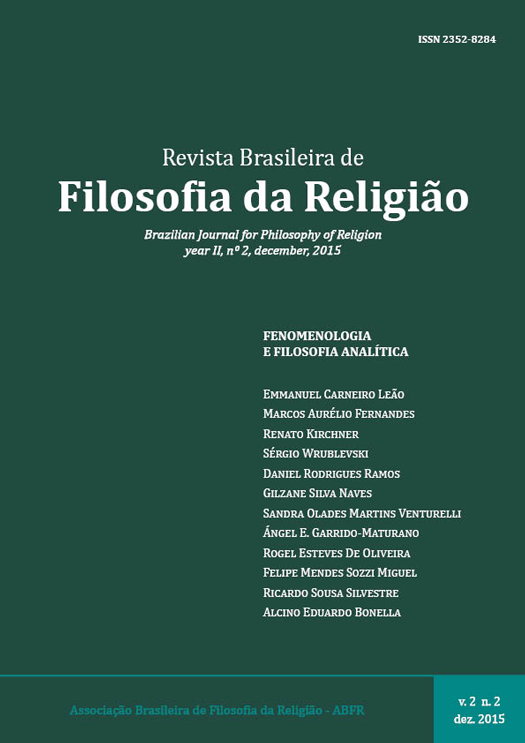Theistic arguments from the reliability of our cognitive faculties
DOI:
https://doi.org/10.26512/2358-82842015e17381Palabras clave:
Theistic arguments. Evolutionary Argument against Naturalism. Reliability. Cognitive faculties.Resumen
Alvin Plantinga’s Evolutionary Argument against Naturalism (henceforth EAAN) is an argument for the conclusion that the conjunction of naturalism and evolutionary theory is self-defeating and cannot be rationally believed. Although the EAAN is not a straightforward argument in favor of theism, it doesn’t seem difficult to derive from the material used to defend its premises an argument in defense of the existence of God. The goal of this paper is to explore how theistic arguments from the reliability of our cognitive faculties can be formulated from the material presented by Plantinga in his defenses of the EAAN. I begin by presenting the most recent formulation of the EAAN. I then explore the possibility of formulating arguments based on inference to the best explanation, deductive arguments, and inductive ones.
Descargas
Citas
BEILBY, James. Naturalism Defeated? Essays on Plantinga’s Evolutionary Argument Against
Naturalism. Ithaca: Cornell University Press, 2002
CHILDERS, Geoff. (2011) What’s Wrong with the Evolutionary Argument against Naturalism?
International Journal for Philosophy of Religion, 69 (3), 2011, p.193-204.
CHURCHLAND, Paul. Is Evolutionary Naturalism Epistemologically Self-Defeating? Philo, 12
(2), 2009, p.135-141.
DAVIS, Stephen T. God, Reason and Theistic Proofs, Grand Rapids: Eerdmans,1997.
FITELSON, Branden; SOBER, Elliott (1998). Plantinga’s Probability Arguments against Evolutionary
Naturalism. Pacific Philosophical Quarterly, 79, 2, 1998.
LESLIE, John. Value and Existence, Blackwell, 1979.
McGREW, Timothy; DePOE, John. Natural Theology and the Uses of Argument, Philosophia
Christi, Winter 2013.
MIRZA, Omar. A User’s Guide to the Evolutionary Argument Against Naturalism. Philosophical
Studies 141 (2), 2008, p.125 - 146.
______. The Evolutionary Argument Against Naturalism. Philosophy Compass 6 (1), 2011, p.78-
NAGEL, Thomas. Mind and Cosmos: Why the Materialist Neo-Darwinian Conception of Nature
is Almost Certainly False. Oxford: Oxford University Press, 2012.
PLANTINGA, Alvin. “Two Dozen (or so) Theistic Arguments”, 1986. Available online at http://
www.calvin.edu/academic/philosophy/virtual_library/articles/plantinga_alvin/two_dozen_or_so_theistic_
arguments.pdf
______. Warrant and Proper Function. Oxford: Oxford University Press, 1993.
______. Naturalism Defeated. Unpublished manuscript, 1994.
______. Warranted Christian Belief. New York: Oxford University Press, 2000.
______. Introduction. In Beilby, James (ed.). Naturalism Defeated? Essays on Plantinga’s Evolutionary
Argument Against Naturalism. Ithaca: Cornell University Press, 2002a.
______. Reply to Beilby’s Cohorts. In Beilby, James (ed.). Naturalism Defeated? Essays on Plantinga’s Evolutionary Argument Against Naturalism. Ithaca: Cornell University Press, 2002b.
PLANTINGA, Alvin; TOOLEY, Michael. Knowledge of God. Blackwell, 2008.
PLANTINGA, Alvin. Self-Profile, In DANCY, Jonathan; SOSA, Ernest; STEUP, Matthias, A
Companion to Epistemology. Second Edition. Wiley-Blackwell, 2010.
PLANTINGA, Alvin; SEGAL, Aaron. Response to Churchland, Philo, Volume 13, Issue 2, Fall/
Winter, 2010.
PLANTINGA, Alvin. Where the Conflict Really Lies: Science, Religion, and Naturalism. Oxford,
Oxford University Press, 2012a.
______. Why Darwinist Materialism is Wrong. The New Republic, 2012b. Online version: http://
www.newrepublic.com/article/books-and-arts/magazine/110189/why-darwinist-materialism-wrong
______. Theism, Naturalism, and Rationality. Berkley Center for Religion, Peace and World Affairs,
Available online: https://www.youtube.com/watch?v=ApvLxnHq8Zs
SOBER, Elliot. Remarkable Facts, Boston Review of Books, 2012. Online version: http://www.
bostonreview.net/books-ideas/remarkable-facts.
SOSA, Ernest. Comments on Plantinga’s EAAN: Theism, Naturalism, and Rationality. Berkley
Center for Religion, Peace and World Affairs, 2013. Available online: https://www.youtube.com/
watch?v=ypDXH9dhUBQ

